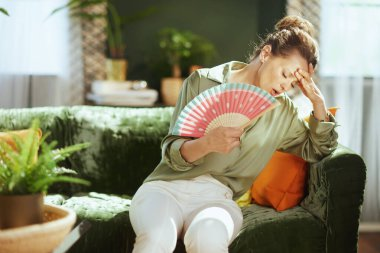Is Your Summer Slump Just Heat? The Secret of Seasonal Depression

Understanding the Summer Slump
The summer slump is a common experience for many, where the heat feels oppressive, the air is thick and heavy, and suddenly, your mood plummets without any clear reason. This phenomenon, often referred to as “summer SAD,” is more than just a temporary dip in energy—it can be a form of depression that affects people during the warmer months.
While seasonal affective disorder (SAD) is typically associated with the winter season, the summer version of SAD is often overlooked and under-researched. Experts like Kelly Rohan, a professor of psychology at the University of Vermont, emphasize that existing studies on summer SAD are limited, dating back to the late 1980s and early 1990s, with small sample sizes. This lack of research has led to a misunderstanding of the condition, making it even more challenging for those who suffer from it to seek appropriate help.
Symptoms and Causes of Summer SAD
Summer-pattern SAD differs from its winter counterpart in several ways. Instead of craving carbohydrates and feeling sluggish, individuals experiencing summer SAD may face symptoms such as insomnia, a reduced appetite, and irritability. These symptoms are not just a result of the heat but are deeply connected to the way the body and mind respond to high temperatures.
Dr. Tanisha Ranger, a clinical psychologist and chief of Nevada’s largest mental health provider, explains that extreme heat can impact serotonin production, a key hormone responsible for regulating mood. When serotonin levels drop, it can lead to increased irritability and disrupted sleep patterns. The combination of heat, lack of movement, and social isolation can create a vicious cycle that worsens symptoms of depression and anxiety.
The Impact of Heat on Mental Health
Heatwaves and rising global temperatures have significant implications for mental health. Over half of all Americans report worrying about the effects of heatwaves and climate change. During heatwaves lasting more than three days, hospital visits for mental health issues can increase by nearly 10%. Even a slight rise in temperature can have a measurable impact on suicide rates and suicidal behaviors.
During hot weather, brain serotonin levels can decrease, particularly in individuals who are more susceptible to these changes. Serotonin plays a crucial role in regulating mood, sleep, and appetite. Additionally, heat can interfere with melatonin, the hormone responsible for regulating sleep. This disruption can lead to increased irritability, poor sleep quality, and heightened stress levels.
Coping Strategies for Summer SAD
If you suspect that summer SAD is affecting your mental health, it's important to seek professional help rather than trying to manage it alone. Experts recommend visiting a clinician who can develop a personalized treatment plan. Treatments such as psychotherapy, cognitive behavioral therapy, and antidepressant medications have proven effective in managing depression.
Cognitive Behavioral Therapy for SAD (CBT-SAD) can be particularly helpful in addressing negative thought patterns and developing healthier habits. Selective serotonin reuptake inhibitors (SSRIs) can also help regulate the brain chemicals affected by the heat. However, there are also steps you can take on your own to maintain your mental well-being during hot weather.
Practical Tips for Managing Summer SAD
Staying hydrated is essential. Dehydration can contribute to irritability and stress, so drinking plenty of water and consuming water-rich foods like cucumbers and watermelon can help. Exercise is beneficial, but it's best to do it when the temperature is cooler or indoors, such as through yoga or stretching.
Cooling down physically can also have a calming effect. Taking cold showers, wearing loose clothing, using fans, or applying a cold, wet cloth around your neck can help lower body temperature and ease mental stress. Human connection is another powerful tool—reaching out to a loved one, even through a phone call or video chat, can provide emotional support and reduce feelings of loneliness.
Mindfulness practices, meditation, and deep breathing exercises can also help manage stress and bring a sense of calm. If you're already receiving treatment for a mental health condition, it's important to continue with your prescribed regimen and discuss any worsening symptoms with your healthcare provider.
Early Intervention is Key
Early intervention can make a significant difference in preventing the cycle of seasonal depression from starting. By addressing symptoms early and implementing effective coping strategies, it's possible to manage summer SAD successfully. As experts like Kelly Rohan emphasize, the sooner treatment begins, the more effective it can be in interrupting the cycle of depression.
Summer SAD is not something to be ignored or dismissed as a personal weakness. It's a real condition that can be treated with the right support and strategies. With the right tools and resources, it's possible to navigate the challenges of summer and find relief, even on the hottest days.
Post a Comment for "Is Your Summer Slump Just Heat? The Secret of Seasonal Depression"
Post a Comment